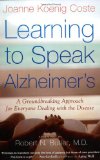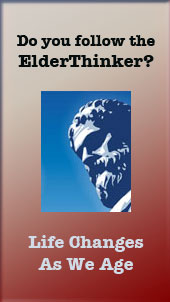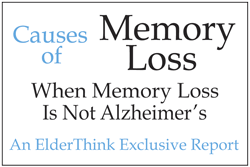
Health, Wellness & Wisdom:
People Don't Believe Alzheimer's Can Be Treated
Gretchen Heuring for ElderThink
There is a stream of new information and medical breakthroughs that effect the health and well-being of matures. There is a lot of misinformation too. I think there might be so much that even doctors can't keep up so it's up to us to learn as much as we can if we're worried about something.
I think one of the biggest problems is that the press gets excited about some new news about a medical breakthrough and the stories get bigger and bigger. But the basic information is often based on a modest study using a few laboratory animals or a small survey of humans. Then, sometime later, a new bit of information is released that contradicts the first. It's just like crying wolf. After awhile, we stop believing any medical news.
So I'm not at all surprised by the results of a large survey about Alzheimer's released recently. This particular survey was commissioned by a venerable and respected group of physicians and other experts on senior health. The group is called the ADSDG (Alzheimer's Disease Screening Discussion Group) and the survey was conducted by Harris Interactive, a well-known company. Over a thousand people over the age of 55 were surveyed too. (Much better than 3 mice)
The results disclosed that most of us are unable to identify Alzheimer's symptoms for sure, and even though we say we would encourage a loved one to get screening if we suspect Alzheimer's, most of us actually do not take that step.
Even worse, most of us don't even know that there are medications available and don't understand how treatment works. We don't make plans either, so we struggle along watching our loved ones sink into oblivion until it is too late to make important decisions together.
It sounds to me like we are all in denial. Wake up and pay attention! The following is from someone who should know:
"There are many reasons to seek out an Alzheimer's diagnosis soon after first symptoms are suspected," said Dr. Paul R. Solomon, professor, department of psychology and program in neuroscience, Williams College; clinical director, The Memory Clinic in Bennington, VT; and survey co-chair and member of the ADSDG. "Not only are there treatments that can slow the progression of symptoms, but an early diagnosis also gives the patient and their loved ones more time to adjust to the news and make important decisions together before the disease advances, impacting the patients' ability to interact and function."









